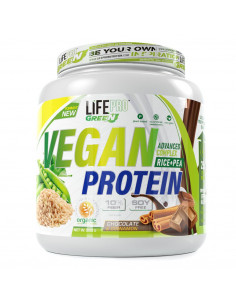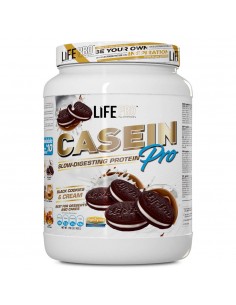Buy Protein Online
Protein is one of the three main macronutrients and the most common preference among athletes. In Life Pro you will find all kinds of protein products of the best quality in the market. Protein powders to take in shakes are the most demanded supplement by strength athletes, crossfit and bodybuilders.
What is protein?
Proteins are one of the 3 macronutrients that our body needs every day. They are made up of small structures called amino acids.
In the world of sport, proteins are one of the most important nutrients, as they are responsible, among other functions, for building and maintaining muscle mass, as well as preventing its loss (catabolism) and favouring the recovery of muscle tissue damaged during training.
The amino acids that make up proteins are classified into two groups: essential and non-essential amino acids. Essential amino acids are those which our body cannot produce by itself, and which must therefore be supplied through food or supplementation. Non-essential amino acids, on the other hand, can be produced within the body.
By defining a protein as "of high biological value", we mean that it contains the 9 essential amino acids. Proteins of animal origin contain these 9, unlike those of vegetable origin, which generally lack one or more amino acids.
Supplements to prepare protein shakes are one of the most widely used dietary supplements in the world of sport. They make it easier to meet the requirements of this macronutrient in a simple and convenient way. There are a multitude of flavours to choose from, as well as a variety of protein supplements depending on their origin, vegetable or animal, their absorption time or even their level of purity.
What types of protein can we find?
Whey protein:
Whey protein is that which, as its name suggests, is obtained from milk, by separating the casein from the whey. It is considered to be of high biological value because it contains the 9 essential amino acids that our body cannot produce.
It is one of the most widely used types of protein, due to its rapid absorption, variety of flavours available and versatility when consumed.
Depending on the level of processing to which it has been subjected, there are 3 types of whey protein.
Whey / Concentrated: one of the most widely used due to its rapid absorption. Its filtering process is less: it contains lactose and a slightly higher percentage of fat. It is one of the most accessible sources.
Isolated: it has a higher level of purity than the previous one. Its fat and lactose levels are reduced.
Hydrolysed: this is the purest source of milk protein. It contains no lactose or, in very low amounts, no fat. It does not upset the stomach and is easily digested and absorbed.
Slow release protein:
Casein:
Casein is a type of protein that comes from whey and its main characteristic is its slow digestion, absorption and release in the body.
When we take casein, micelles are formed in our stomach that achieve a slower and more progressive digestion over time. Its main advantage and function is that it helps prevent catabolism or loss of muscle mass and promotes recovery. In addition, it is a protein with a higher satiety index compared to other types.
This type of protein is the most recommended when we want to guarantee a supply of amino acids during a prolonged period when we are not going to eat any food or supplement: a key moment for casein intake could be before going to bed or before starting a period of intermittent fasting.
There are two types of casein: micellar casein and calcium caseinate. Calcium caseinate has a slightly shorter absorption time (3-4 hours). When produced, the micelles are broken down and combined with a calcium source. Micellar casein releases amino acids for 6 to 8 hours and has not been denatured.
Egg and meat protein:Egg protein is called albumin. It is a source of high biological value and is highly absorbed and assimilated by the body. It does not contain lactose.
Meat protein: is of high biological value and is rapidly absorbed by the body.
Vegetable protein:It comes from vegetable sources. It is recommended for vegans or vegetarians, and even for those who are lactose intolerant. They are obtained from different sources:
- pea
- rice
- soya
- hemp
We can also find combinations of different vegetable protein sources, because they usually lack the presence of one or several amino acids. When combined, the complete aminogram can be obtained.
What is the best protein?
The best protein is the one that meets the requirements and objectives of the person who is going to consume it.
It is recommended to choose according to individual needs and preferences: a protein of high quality and purity, recommended for all people who consume animal protein, is hydrolysed protein, due to its purity and low fat and lactose content.
How many grams of protein per day should I take?
The grams of protein required per day depend on the individual. It is important to individualise in each case and take into account various factors, such as lifestyle, level of physical activity, your weight, height, etc.
To calculate the daily amount of protein we can take the following values as a reference:
- Sedentary people: between 0.8 and 1.2 grams per kilogram of weight.
- Physically active people: between 1 and 1.5 grams per kilogram of body weight.
- People practising strength sports: between 1.5 grams and 2.5 grams per kilogram of body weight.
A person who trains with weights, with a body weight of 80 kilograms, and who decides to consume 2 grams of protein per kilogram of body weight, will consume a total of 160 g of protein per day.
These amounts are guidelines. They may vary depending on the individual and lifestyle.
When to take protein?
Protein can be taken at any time of the day.
- Before training: to ensure a supply of amino acids to the muscles and guarantee their maintenance.
- After training: to promote recovery of damaged fibres and muscle mass gain.
- Throughout the day: it is important to provide the total daily amount needed by the body. We can divide it into several intakes, including one or more sources in all the meals we eat.
- Before going to bed: at this time, a slow-release protein that provides amino acids during the hours of rest is recommended.







